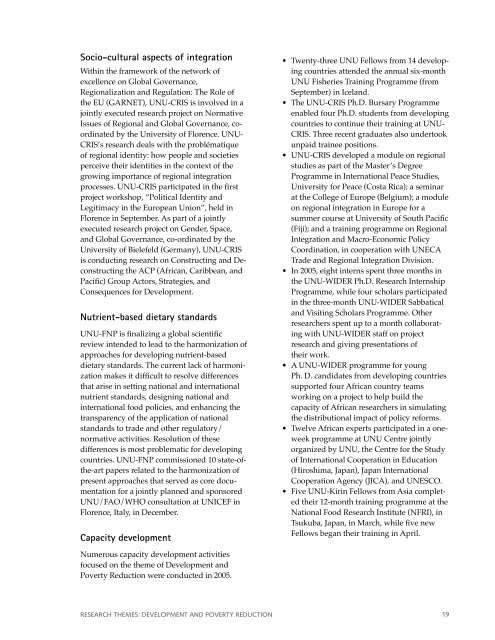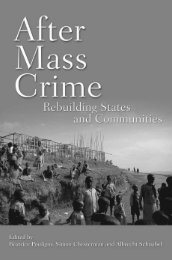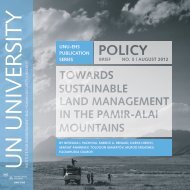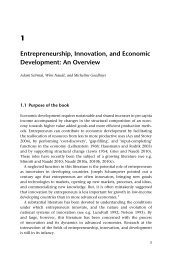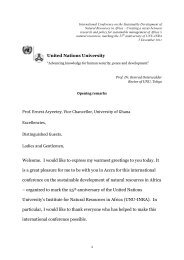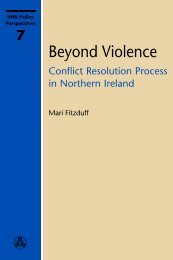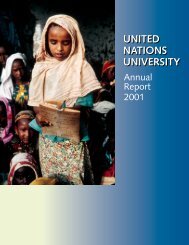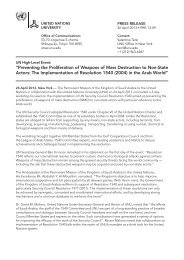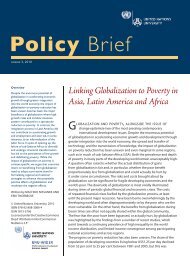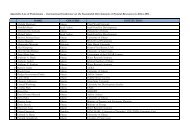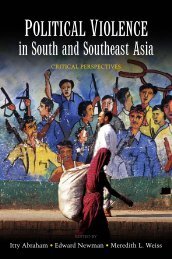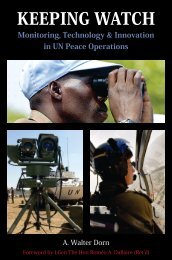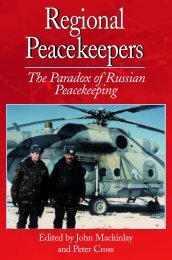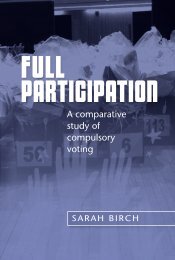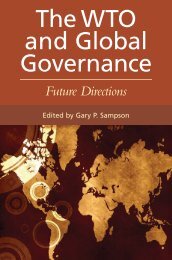UNU Annual Report, 2005 - United Nations University
UNU Annual Report, 2005 - United Nations University
UNU Annual Report, 2005 - United Nations University
- No tags were found...
You also want an ePaper? Increase the reach of your titles
YUMPU automatically turns print PDFs into web optimized ePapers that Google loves.
Socio-cultural aspects of integrationWithin the framework of the network ofexcellence on Global Governance,Regionalization and Regulation: The Role ofthe EU (GARNET), <strong>UNU</strong>-CRIS is involved in ajointly executed research project on NormativeIssues of Regional and Global Governance, coordinatedby the <strong>University</strong> of Florence. <strong>UNU</strong>-CRIS’s research deals with the problématiqueof regional identity: how people and societiesperceive their identities in the context of thegrowing importance of regional integrationprocesses. <strong>UNU</strong>-CRIS participated in the firstproject workshop, “Political Identity andLegitimacy in the European Union”, held inFlorence in September. As part of a jointlyexecuted research project on Gender, Space,and Global Governance, co-ordinated by the<strong>University</strong> of Bielefeld (Germany), <strong>UNU</strong>-CRISis conducting research on Constructing and Deconstructingthe ACP (African, Caribbean, andPacific) Group Actors, Strategies, andConsequences for Development.Nutrient-based dietary standards<strong>UNU</strong>-FNP is finalizing a global scientificreview intended to lead to the harmonization ofapproaches for developing nutrient-baseddietary standards. The current lack of harmonizationmakes it difficult to resolve differencesthat arise in setting national and internationalnutrient standards, designing national andinternational food policies, and enhancing thetransparency of the application of nationalstandards to trade and other regulatory/normative activities. Resolution of thesedifferences is most problematic for developingcountries. <strong>UNU</strong>-FNP commissioned 10 state-ofthe-artpapers related to the harmonization ofpresent approaches that served as core documentationfor a jointly planned and sponsored<strong>UNU</strong>/FAO/WHO consultation at UNICEF inFlorence, Italy, in December.Capacity development• Twenty-three <strong>UNU</strong> Fellows from 14 developingcountries attended the annual six-month<strong>UNU</strong> Fisheries Training Programme (fromSeptember) in Iceland.• The <strong>UNU</strong>-CRIS Ph.D. Bursary Programmeenabled four Ph.D. students from developingcountries to continue their training at <strong>UNU</strong>-CRIS. Three recent graduates also undertookunpaid trainee positions.• <strong>UNU</strong>-CRIS developed a module on regionalstudies as part of the Master’s DegreeProgramme in International Peace Studies,<strong>University</strong> for Peace (Costa Rica); a seminarat the College of Europe (Belgium); a moduleon regional integration in Europe for asummer course at <strong>University</strong> of South Pacific(Fiji); and a training programme on RegionalIntegration and Macro-Economic PolicyCoordination, in cooperation with UNECATrade and Regional Integration Division.• In <strong>2005</strong>, eight interns spent three months inthe <strong>UNU</strong>-WIDER Ph.D. Research InternshipProgramme, while four scholars participatedin the three-month <strong>UNU</strong>-WIDER Sabbaticaland Visiting Scholars Programme. Otherresearchers spent up to a month collaboratingwith <strong>UNU</strong>-WIDER staff on projectresearch and giving presentations oftheir work.• A <strong>UNU</strong>-WIDER programme for youngPh. D. candidates from developing countriessupported four African country teamsworking on a project to help build thecapacity of African researchers in simulatingthe distributional impact of policy reforms.• Twelve African experts participated in a oneweekprogramme at <strong>UNU</strong> Centre jointlyorganized by <strong>UNU</strong>, the Centre for the Studyof International Cooperation in Education(Hiroshima, Japan), Japan InternationalCooperation Agency (JICA), and UNESCO.• Five <strong>UNU</strong>-Kirin Fellows from Asia completedtheir 12-month training programme at theNational Food Research Institute (NFRI), inTsukuba, Japan, in March, while five newFellows began their training in April.Numerous capacity development activitiesfocused on the theme of Development andPoverty Reduction were conducted in <strong>2005</strong>.RESEARCH THEMES: DEVELOPMENT AND POVERTY REDUCTION19


